Volcanoes are erupting in The Philippines, but on-fire Australia received some welcome rain. The Iran war cries have been called off and The Donald’s military powers are about to be hamstrung by the Senate. Meanwhile, his impeachment trial is starting, and we’re all on Twitter for a front-row seat.
What Could Go Right? The next pandemic
Climate activists celebrate several wins, the possibilities of mRNA combination vaccines, free birth control, and more
This is our weekly newsletter, What Could Go Right? Sign up here to receive it in your inbox every Thursday at 6am ET. You can read past issues here.
Vive la France, where birth control just became free for under-25-year-olds, along with related medical appointments, tests, and other medical procedures! With birth control apparently too damn expensive to make a habit of, contraceptive use among French 18–25 year-olds was dropping. Enter this new law, an obvious next step after previous law changes to make birth control free for under-18-year-olds led to fewer abortions. (French women over 25 receive a reimbursement of about 65% for birth control.)
If you had to choose a good place to get your period, would you choose Minnesota or Kenya? Trick question: they’re both trailblazers in the movement to abolish the tampon tax, which means you’re better off, from a spending perspective, in either place than in most of the world. Minnesota was the first state in the United States to strike the tax in 1981; Kenya got rid of theirs in 2004. No one, of course, chooses to get a period. And yet menstrual products are still taxed as luxury items in many states and countries. Check out where we stand vis a vis abolishing the tampon tax in our latest Progress in Five Minutes.
Who doesn’t love it when David beats Goliath? If you’ve ever doubted whether there’s a point to protesting, take a look at this new study from the Indigenous Environmental Network and Oil Change International that found Indigenous resistance over the past decade to 21 fossil fuel projects has stopped or delayed 1.587 billion metric tons of annual greenhouse gas emissions. That’s the equivalent emissions of 400 new coal-fired power plants—or 25% of the US’ and Canada’s emissions combined.
A few days ago, climate activists triumphed as Harvard University quietly divested from fossil fuel, following in the footsteps of the Pope, the University of California, and Norway’s pension funds. And in Malaysia’s western state of Selangor—where Kuala Lumpur is—the state government took “an unprecedented U turn,” after a week of backlash, when they announced they would hand over more than half of a forest reserve to private developers. The plans have now been canceled, to the relief of local Malaysians, as well as rare species like the Malayan sun bear and Selangor pygmy flying squirrel, who call the forest reserve home.
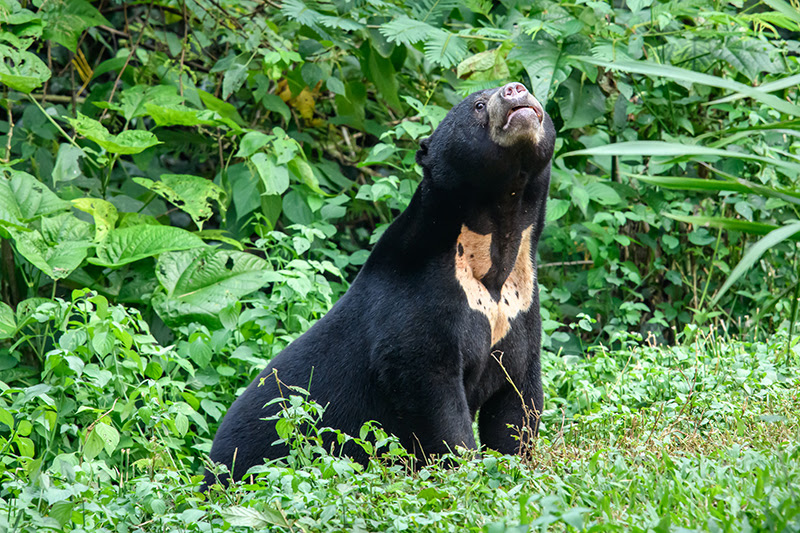
Can you imagine: it’s October 2023, and Covid-19 has gone from a world-shuttering novel virus to a seasonal annoyance. You head off to your nearest pharmacy for your annual flu shot, and that same injection protects you from Covid, too. In our books, that counts as seriously incredible fantasy. Okay, it’s possible we’re among only a few weirdos truly excited about mRNA vaccines’ combinatorial possibilities. But at least you might not have to go to the pharmacy twice, all right? Moderna and Novavax are now both working on a Covid-flu combo vaccine.
An update from Tuesday on the timeline for a Covid vaccine for children in the US: Pfizer will file for emergency use authorization in early October for kids aged 5–11. For kids 6 months to 5 years, we’re looking at early November.
While COVAX, the global vaccination distribution project, is currently 500 million doses behind its goal—mostly because rich countries didn’t play nice in the sandbox—its mere existence is progress. Despite a gloomy title that focuses on what went wrong, this article from TIME on everything COVAX, from conception to execution, is a powerful statement on what can happen with international cooperation. COVAX has been far from perfect, but nothing is perfect on the first go-around, and COVAX is the first of its kind. We’ve never attempted to collectively distribute vaccines for a single disease worldwide before. Now that we have the structure, we can build on it for future pandemics.
This brings to mind another fantasy: we’re hit with a pandemic again. But instead of Delta ruining things, it’s hot vax summer practically from the start. Why? Delta never even had time to appear, because we had developed, manufactured, and distributed vaccines to everyone, everywhere, so flippin’ fast.
Despite a high-profile divorce, inveterate optimists Bill and Melinda Gates are still at it, it being saving the world. Their foundation’s 2021 Goalkeepers Report, an assessment of global progress after an astoundingly difficult year, is beautifully designed and easy to read. There is no way the pandemic could have led to unsullied good news, but there was reasonable worry at the beginning that it would erase 25 years of work. Instead, the report says, “On many key development indicators, the world stepped up over the past year to avert some of the worst-case scenarios.”
There are some wonderful individual stories included in the report as well, which haven’t been touched by mainstream media. Benin, for instance, where malaria is the leading cause of death, in the midst of the pandemic “created a new, digitized distribution system for insecticide-treated bed nets, getting 7.6 million nets into homes across the country in just 20 days.” In Pakistan, an emergency cash program provided assistance to over 40% of its population. Two-thirds of the recipients were women, bringing 10 million of them into the formal financial system for the first time.
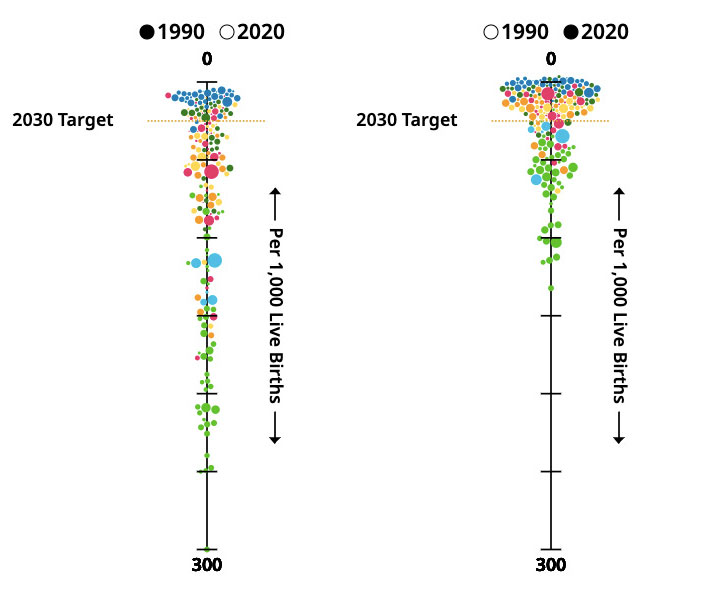
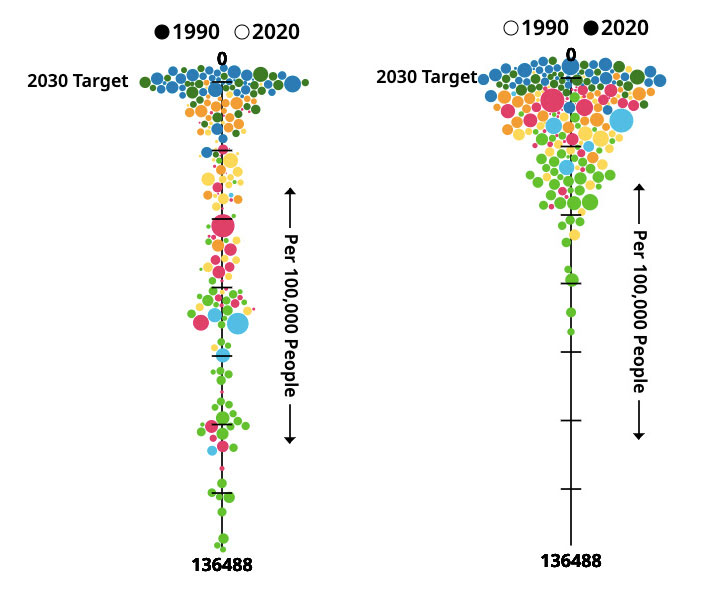
Before we go, are you among the young people hesitant to bring children into a climate-threatened future? In the latest issue of Works in Progress magazine, a counter-take: go ahead, have those babies, for the good of the world. Really.
And, uh, just in case you saw the Nicki Minaj tweet . . .
Below in the links section, a sharp drop in child poverty in the US, bye-bye to leaded gasoline, researchers are closing in on long Covid, an abortion “whistleblower” site and racist algorithms are facing resistance, and more.
From us: If politics is the new religion, we’re in desperate need of reform. In the latest episode of What Could Go Right?, Alison Goldsworthy, CEO of The Depolarization Project, and Jonathan Haidt, Professor of Ethical Leadership at New York University Stern School, examine how we’ve landed in the middle of a polarization hurricane and how we can get out if it. In the long run, they tell us, things are likely to settle. But short-term, Gen Z in particular might be in for a rocky ride. Listen to it here.
Progress, Please
(Found good news? Tweet at us @progressntwrk or email.)
Other good stuff in the news
United States
- America is substantially reducing poverty among children | The Economist
- California is launching a 988 hotline for mental health crisis calls | The Record
- New York is banning the sale of gas-powered cars starting in 2035 | Bloomberg Law
- The Texas abortion “whistleblower” site has struggled to find a host | Wired
- Louisiana artists are mobilizing to help Hurricane Ida victims | Hyperallergic
- Covid didn’t lead to a pandemic of hunger in the US | Axios
International
- Northern hairy-nosed wombats are back from the brink after dropping to just 35 in the 1980s | ABC News
- One of the worst public health dangers of the past century, leaded gasoline, has finally been eradicated | Vox
- Global windfarm installations are expected to surge after a Covid slowdown | The Guardian
- These super crops can save us from climate disaster | Wired UK
- Arkansas researchers have found a possible cause of long Covid symptoms | THV11
- The practical way Pinterest is fighting racist algorithms | Fast Company
- A Chinese city has built a “food court” for future migrating elephants | South China Morning Post
- Greece is transitioning its power market to lure renewables investors | S&P Global
- The world’s biggest beef exporter, Brazil, has approved a methane-busting cow feed | Yahoo!/Bloomberg
- The government of New South Wales has declared a zero extinction goal for national parks | The Sydney Morning Herald
- The world’s biggest plant to capture CO2 from the air just opened in Iceland | The Washington Post
- Kuwait is transforming its “tire graveyard” into a new smart city | Euronews
- The Grannies for Future movement is helping to raise climate awareness among older generations | DW
TPN Member Originals
- What two 9/11 anniversaries can teach us about the role of religion | Eboo Patel
- Professor of Forest Ecology Suzanne Simard on how forests are wired for wisdom | Krista Tippett
- The future of Mexico’s energy markets, with former Mexican Deputy Secretary for Planning and Energy Transition Leonardo Beltrán Rodríguez | Jason Bordoff
- In conversation with Robert Glazer on building grit in life and business | Angela Duckworth
- Talking political division, GDP growth, and classical music with Ezra Klein | Tyler Cowen
- Have we reshaped Middle East politics or started to mimic it? | Thomas L. Friedman
- The US democracy agenda can’t focus simply on supporting democratic governments | Suzanne Nossel
Upcoming Events
- Diversity in Office, Equity in Campaigns | Anne-Marie Slaughter | September 23
- Unfinished Live | Eli Pariser, Andrew McLaughlin, Anne-Marie Slaughter | September 23
- Great Conversations: What’s the Role of a Citizen in 2021? | Theodore R. Johnson | September 28
- Seeing Around Corners: Five Tips to Navigate Inflection Points and Build Resistance | Rita Gunther McGrath | September 28
- The Raging 2020s with Hillary Rodham Clinton | Alec Ross | September 29
- The AI Awakening: What It Means For Productivity And Business Performance | Erik Brynjolfsson | October 7
- Labor Organizing Today, Promises and Pitfalls | Roy Bahat | October 8
- Freer Future Fest | Faisal Saeed Al Mutar | October 9
- Why Mobility Is Destiny | Parag Khanna | October 13
On Our Bookshelf
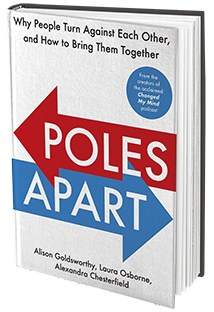
In Poles Apart, TPN Member and polarization expert Alison Goldsworthy joins Alexandra Chesterfield, a behavioral scientist, and Laura Osborne, a professional communicator, to explain why we are so prone to be drawn into rival, often deeply antagonistic factions. They explore the shaping force of our genetic make-up on our fundamental views and the nature of the influences that family, friends, and peers exert. They pinpoint the economic and political triggers that tip people from healthy disagreement to dangerous hostility, and the part played by social media in spreading entrenched opinions. And they help us to understand why outlooks that can seem so bizarre and extreme to us seem so eminently sensible to those who hold them.
Learn more about the book and buy it here.
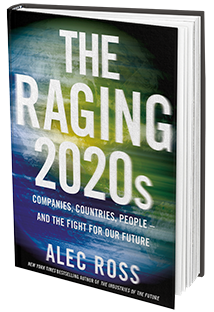
For 150 years, there has been a social contract. Companies hold the power to shape our daily lives. Governments hold the power to make them fall in line. And the people hold the power to choose their leaders. But now, this balance has shaken loose. Today’s global companies are as powerful as countries, and on issues ranging from privacy to sustainability to diversity and workers’ rights, we are more governed by companies than we are by governments. Whether the future looks more like Star Trek or more like Mad Max comes down to a very human question that we cannot outsource to algorithms: will we come together to rewrite our social contract? As the world rages amidst pandemic, rising inequality, and increasingly frequent climate disasters, TPN Member Alec Ross—a New York Times–bestselling author, former senior advisor to the Secretary of State and Distinguished Visiting Professor at the University of Bologna Business School—offers a path forward in The Raging 2020s.
Learn more about the book and buy it here.
Until Next Time
Wait, so reading Twitter and doing scientific research are two different things?


